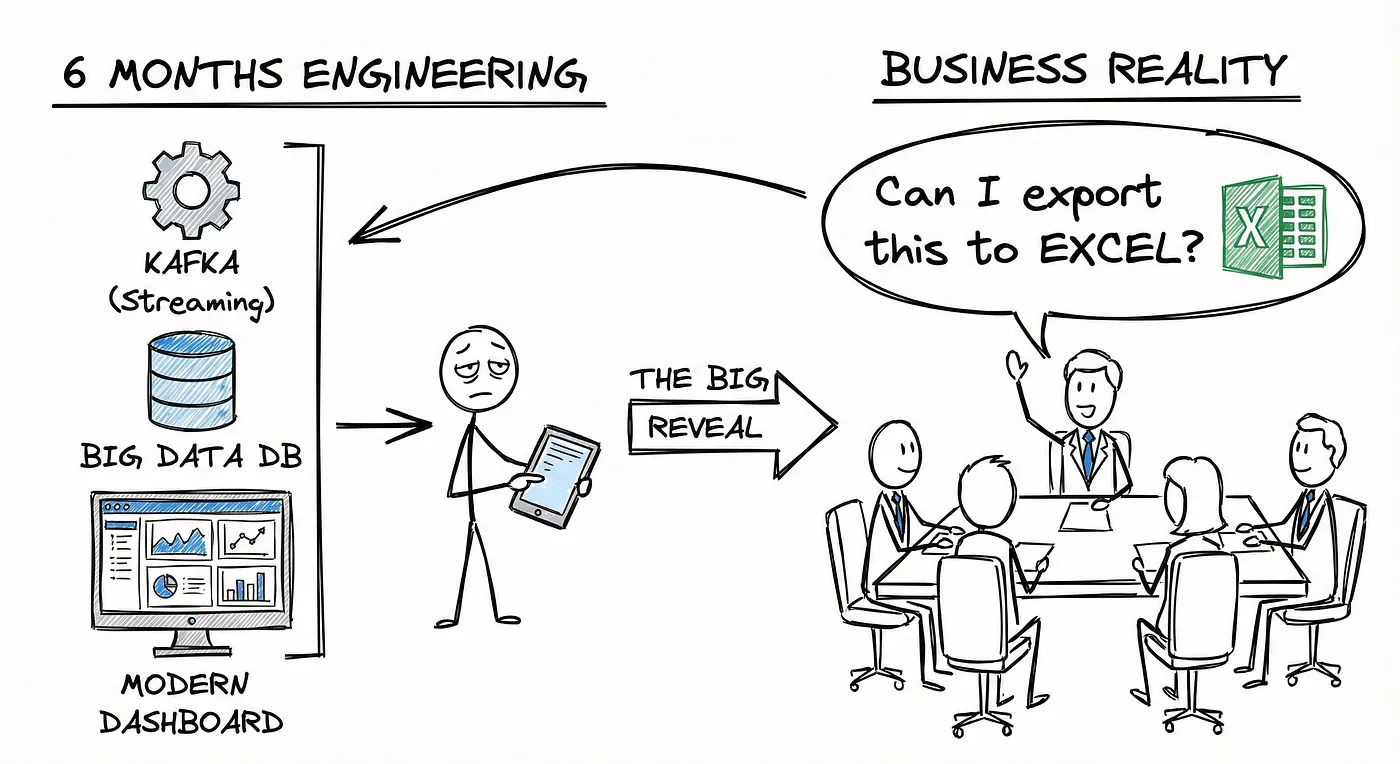A glimpse into the life of a data leader
Oct 21, 2024
•
Kris Peeters
Data leaders face pressure to balance AI hype with data landscape organization. Here’s how they stay focused, pragmatic, and strategic.
Last week, Dataminded organised a data leadership roundtable. We invited 20 decision takers of large data organisations, from Belgium, the Netherlands and Germany. Their roles were described as “Head of Data”, “Data Governance Lead”, “Business Area Lead Advanced Analytics”, “Head of Data Management”, … And although their titles are different, their challenges were similar.
The night gave us a glimpse into the life of a data leader. In this blog, I want to share a few of my own learnings.
Deal with the GenAI hype from business whilst bringing order to your data landscape.
The leaders we talked to, knew very well what they wanted. The vision for their data departments is clear for most leaders. But the way to get there is long. And you can’t do it all at once. Data departments are moving to the cloud, embracing data product thinking, onboarding federated data teams, rolling out data governance programs, setting up AI frameworks, … At the same time, business people have become even more inpatient than in the past. They think GenAI will solve all their problems. With ChatGPT, instant results are at their fingertips. And they expect the same from their data departments.
One executive shared the story of organising a 2 day hackathon with 50+ data scientists and engineers. Business was ecstatic because some amazing results were achieved. Everyone was celebrating the success of the hackathon. But those happy vibes quickly turned into unrealistic expectations. “See, it can be done in 2 days. Why do you need 6 months to industrialise something?” It’s like a gardener yelling at their plants to grow faster.

Business people are getting more impatient with data leaders. And yes, I used ChatGPT to generate this image.
You need to ruffle a few feathers to deliver results
Most of the people in the room were clients of Dataminded. All of them are competent leaders and all of them have talented people in their organisation. All leaders have a clear mandate to “create value from data”. Yet, there are differences between organisations. While some organisations struggle to create momentum, others ship use case after use case, resulting in significant ROI. I asked a few successful leaders what they thought they did differently. They gave me two answers:
Be laser-focused on making your business stakeholders successful. That goes further than just asking them what they want from data. That is deeply understanding their goals, their position in the organisation, the relationships they have with other departments, the tensions between groups, the history, …
Dare to cut things that don’t work. One data leader was faced with a data vault implementation which has been going on for 2 years and was delayed again, with no meaningful output. He switched gears to another approach. Another leader was faced with one particular team which was always objecting to change and sabotaging his efforts. He parked them on a side track. You don’t always make yourself popular with that. And in fact, you risk getting sidelined yourself by those very same people, who will start their own political moves, and shadow-IT data adventures. That’s why you can’t do this without also doing the first bullet point.
Where to draw the line? Knowing when to push for change, and when to be patient, is more of an art than a science. I admire the leaders who can find a good balance between the two. Because I have failed in this many times in the past.

Sometimes, you have to ruffle a few feathers. Generated by ChatGPT.
Consistent pragmatism over perfection
The data landscape is bombarded with new buzzwords and technologies. At the same time, many data organisations still struggle to get the basics right. Most leaders agreed that, when you take any great new idea to the extreme, it usually is counter-productive. A few examples:
A large organisation decided to put strong governance on dashboards in production. “No more looking at the wrong data”. They defined a multi-step process and a whole list of checkmarks that you needed to comply with, before you could publish your dashboards to prod. Result? Almost no dashboard ended up in prod. And non-prod dashboards were used instead.
Another large organisation had a look at their landscape and realised that over time, despite best intentions, they ended up with a data swamp. They could pull the brakes on all use cases and spend 2 years building a centralised “single version of the truth” using techniques such as data vaulting. What they did instead was, take a critical look on which datasets were actually of strategic importance, and were often reused in multiple use cases. They came to the conclusion that there was one such asset that they considered as a competitive advantage, and they spent a lot of time and effort on building a highly reliable data product out of it.
Pragmatism doesn’t mean “cutting corners”. On the contrary. Pragmatism means getting to where you want to go, one step at the time. Always keep the goal in mind at every step.

Consistent pragmatism over perfection. Image generated by ChatGPT.
Conclusion
Data leaders today face increasing pressure from business while they are trying to get organised. To succeed, it’s important that you deeply understand the needs of your stakeholders and dare to drive change within your organisation. This change won’t happen overnight. You need a pragmatic approach to get there.
Latest
You Don’t Have a Data Platform Without Excel
The Most Used Feature is “Export”: Why Your Data Stack Needs a Spreadsheet Strategy
How Knowledge Graphs, Dimensional Models and Data Products come together
In a data-driven organisation data assets should be modelled in a way that allows key business questions to be answered.



